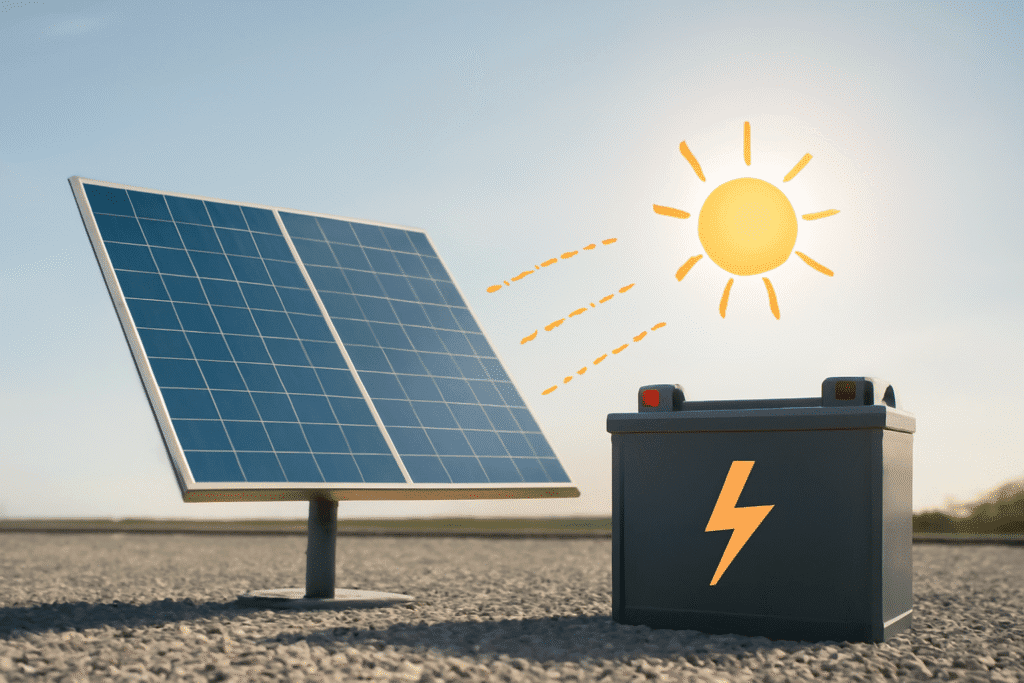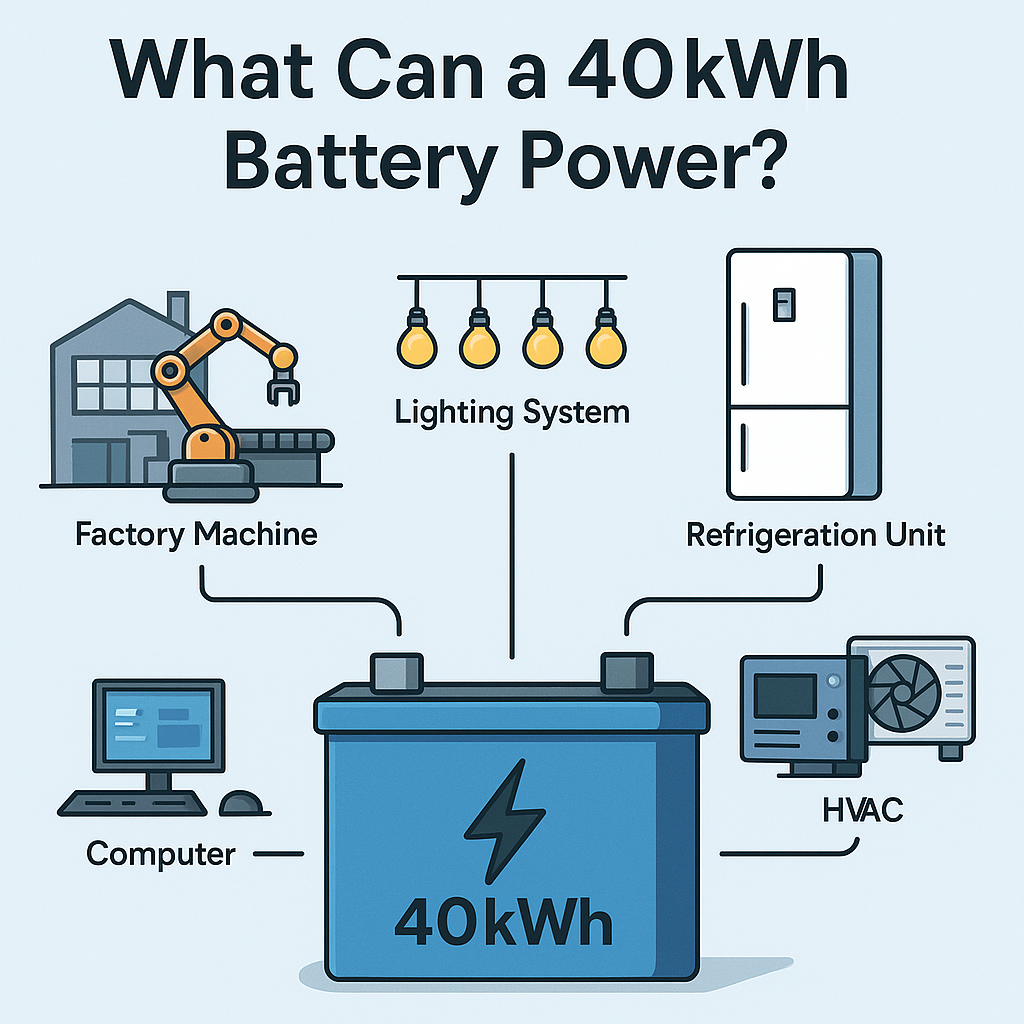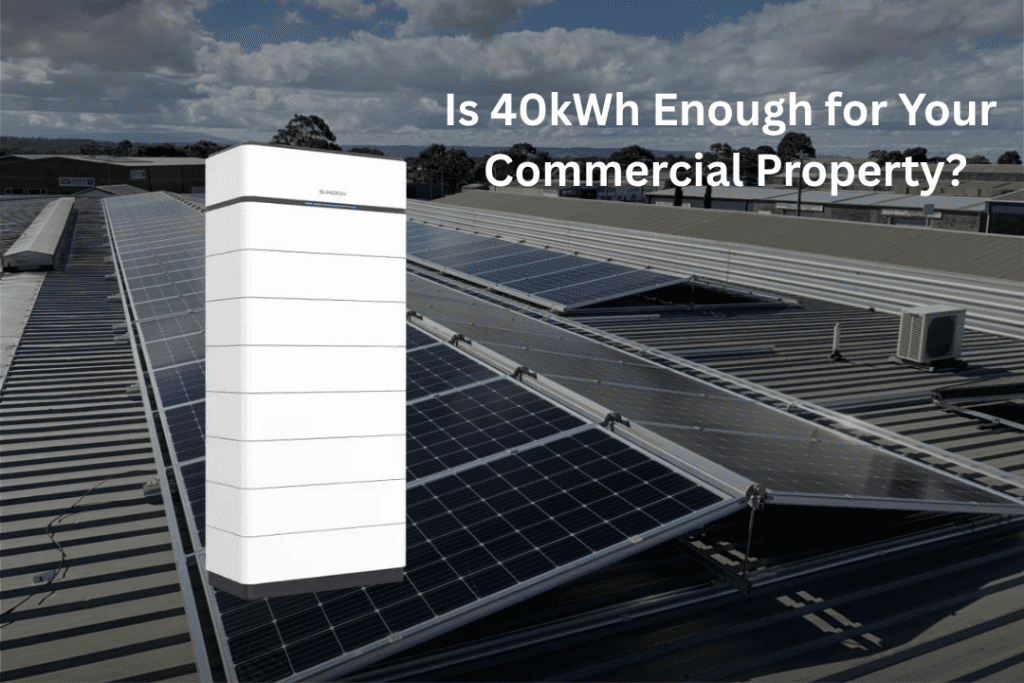SOLAR BATTERY STORAGE SYSTEM
40KWh
Off-grid homes & medium business
$8,299*
get a quote
Submit the form below, our expert will contact with you shortly!
40kWh Solar Battery
If you’re running a commercial setup in Australia and want to get serious about slashing your electricity bills while ensuring smooth operations, a 40kWh solar battery is definitely something you should consider. This size of battery strikes a nice balance — big enough to store a substantial chunk of power but not so massive that it becomes impractical or insanely expensive. A lot of Aussie businesses, from small factories to farms and warehouses, are jumping on this size because it fits their needs pretty well. I’ll explain what exactly a 40kWh battery is, how it can help your business, and what you should expect cost-wise, so you get the full picture before diving in.

DISCOVER THE BEST SOLAR BATTERY FOR YOUR SOLAR SYSTEM
30KWh
Solar Battery
High-usage homes with EV
$
6,299
*
Small Home
- Complete Energy Solution
- 24/7 Power Backup
- Seamless Integration
- High-Quality Energy Storage
40KWh
Solar Battery
Off-grid homes & medium business
$
8,299
*
Medium Home
- Complete Energy Solution
- 24/7 Power Backup
- Seamless Integration
- High-Quality Energy Storage
50KWh
Solar Battery
Large off-grid homes & business
$
9,999
*
Big Family Home
- Complete Energy Solution
- 24/7 Power Backup
- Seamless Integration
- High-Quality Energy Storage

What is a 40kWh Solar Battery?
In simple terms, a 40kWh solar battery is a large-capacity energy storage unit designed for commercial or heavy residential use. It pairs with your solar panel system to store surplus electricity generated during the day. That stored power is then available to use at night or during periods of low solar production — think cloudy days or when your business operates after dark. For many Australian businesses, this means a significant cutback on grid electricity purchases, which can translate to huge savings, especially if your energy provider charges peak rates during busy hours. Plus, it offers peace of mind by providing backup power if the grid ever fails.
How Much Energy Can 40kWh Really Store?
To put 40kWh in perspective, it’s quite a bit of energy. For example, if your factory machinery uses around 5 kilowatts per hour, a fully charged 40kWh solar battery could theoretically keep it running for about eight hours without pulling any electricity from the grid. That’s more than enough to cover an entire night shift or to ride out short outages without losing productivity. Aside from heavy machinery, it can power lighting systems, computers, refrigeration units, and even HVAC systems for extended periods. Many Australian businesses find this level of energy storage just right for managing both daily usage and emergencies.

What is kilowatt-hour (kWh)?
Let’s start at the very basics: a kilowatt-hour, or kWh, is simply a unit of energy. Think of it like measuring how much fuel you use in a car, but for electricity. For example, if you have a machine or device that consumes 1,000 watts (which equals 1 kilowatt), and you run it for one hour, that’s 1 kWh of energy used. So, when someone says a battery has a capacity of 40kWh, it means it can store enough electricity to power that 1,000-watt device for 40 hours straight. Understanding kWh helps you get a grip on how much energy your business consumes and how big a battery you might need to cover your demands.
How many kilowatt-hours do you need?
Now, figuring out your business’s energy needs in kilowatt-hours is a crucial first step. Every business is different. A small office, running computers, lighting, and some air conditioning, might only use around 10-15kWh per day. But if you’re operating a manufacturing plant with heavy machinery or a cold storage facility, your daily energy consumption could easily exceed 40kWh — sometimes even much more. To get it right, check your past power bills or consider getting an energy audit. This will help you decide if a 40kWh battery fits your energy profile or if you’ll need a bigger setup. The key is matching the battery size to your actual needs, so you’re not paying for unused capacity or left short during peak times.
How Much Energy Can 40kWh Really Store?
To put 40kWh in perspective, it’s quite a bit of energy. For example, if your factory machinery uses around 5 kilowatts per hour, a fully charged 40kWh solar battery could theoretically keep it running for about eight hours without pulling any electricity from the grid. That’s more than enough to cover an entire night shift or to ride out short outages without losing productivity. Aside from heavy machinery, it can power lighting systems, computers, refrigeration units, and even HVAC systems for extended periods. Many Australian businesses find this level of energy storage just right for managing both daily usage and emergencies.
Best Use Cases for 40kWh Batteries in Australia
Across Australia, 40kWh solar batteries are making a big impact in various commercial settings. For example, wineries in the Barossa Valley rely on these batteries to keep their refrigeration and production equipment running smoothly through the night. Warehouses in Brisbane use them to manage lighting and climate control efficiently. Remote construction sites in Western Australia are also using these batteries to reduce reliance on noisy diesel generators, cutting both costs and emissions. Essentially, if your business uses moderate to high amounts of power and wants to avoid the unpredictability of grid prices or outages, a 40kWh solar battery is often an excellent fit.
Pros of Using a 40kWh Solar Battery
There are several advantages to investing in a 40kWh solar battery for your commercial property. First, it helps you save money by storing solar energy produced during daylight hours and using it when grid electricity is expensive or unavailable. This load shifting can drastically reduce your power bills, especially if your utility charges peak rates. Second, it provides backup power during outages, which is crucial if your operations can’t afford downtime. Third, using stored solar power reduces your carbon footprint, contributing positively to the environment and your business’s sustainability goals. Lastly, many commercial buyers benefit from government rebates and incentives, which help make the upfront investment more affordable
Downsides You Should Know
- Initial cost: Starting around A$8,299 plus installation. Not cheap, but an investment.
- Size: These batteries take up space, so plan where to install.
- Wear and tear: Over years, battery capacity declines — warranties help cover this.

Is 40kWh Enough for Your Commercial Property?
For many small to medium businesses, 40kWh hits the sweet spot. It can comfortably cover energy needs for lighting, office equipment, refrigeration, and small machinery during non-solar hours. However, if you operate heavy industrial machinery or large-scale refrigeration, you may require a bigger system or multiple batteries. A thorough analysis of your energy consumption patterns will help determine whether 40kWh is sufficient or if scaling up is necessary. Always consider potential growth or changes in your energy usage when planning your battery system.
Price Breakdown: What to Expect
When budgeting, expect the price for a 40kWh solar battery system to start at around A$8,299. This figure varies depending on the brand, battery chemistry (such as lithium-ion or lithium iron phosphate), and additional features like remote monitoring or expandability. Installation costs typically add between A$1,000 and A$3,000, influenced by factors such as site complexity and necessary electrical upgrades. Choosing a qualified installer, preferably CEC-accredited, is essential to ensure safety and optimal system performance.
Installation Costs in Australia
Installing a 40kWh battery system isn’t as simple as plugging it in. It involves electrical work, sometimes upgrading switchboards, adding proper enclosures for weather protection, and running new cabling. This explains why installation costs vary. Hiring a Clean Energy Council (CEC)-accredited installer is crucial because they follow strict Australian standards, ensuring your system is safe and compliant. While the installation might seem like an extra cost, it’s a necessary investment to avoid future headaches and hazards.
Government Incentives & Rebates
Thankfully, the Australian government encourages businesses to adopt renewable energy. Programs like South Australia’s Home Battery Scheme and Victoria’s Solar for Business provide rebates that can shave thousands off your upfront costs. Additionally, federal schemes like Small-scale Technology Certificates (STCs) offer further financial relief. Incentives vary by state and can change, so always check with your installer or government websites for the latest offers to maximize your savings.
Battery Lifespan & Warranty Info
Most 40kWh solar batteries come with warranties ranging from 10 to 15 years or a set number of charge cycles (often between 6,000 and 10,000). Lithium iron phosphate (LFP) batteries are becoming popular for their longer lifespan and slower capacity degradation compared to traditional lithium-ion batteries. Proper maintenance and installation in a cool, sheltered environment can extend battery life even further. Investing in a high-quality battery backed by solid warranties ensures your system will provide value for many years.
FAQs: Quick Answers for Aussie Buyers
Can a 40kWh battery power my whole business?
For many small to medium-sized operations, yes, especially if you manage your energy use smartly. Larger industrial businesses may require bigger or multiple batteries.
Will it reduce my electricity bills?
Definitely. Using stored solar energy means relying less on expensive grid power, particularly during peak pricing hours.
Can I add more batteries later?
Most modern systems are modular, so expanding your capacity as your business grows is usually straightforward.
Do I need permits to install a battery?
Typically no, but local regulations vary, so it’s best to consult with your installer and local council.
How big is a 40kWh battery physically?
They are roughly the size of one or two large refrigerators, so you’ll need adequate space for installation.
WE INSTALL CEC APPROVED POPULAR SOLAR BATTERIES IN AUSTRALIA






- Tesla Powerwall
Great for storing solar energy at home because it is very efficient and lasts a long time.
- Sungrow Battery
Works well and is affordable. It can be used in homes and businesses.
- Sigenergy Battery
A dependable storage option that focuses on being eco-friendly and simple to use.
- Growatt Battery
A small, affordable option that works well.
- SolarEdge Battery
Works best with SolarEdge inverters and gives you excellent monitoring and control.
- GoodWe Battery
A solar storage battery that is reliable, long-lasting, and very efficient.
